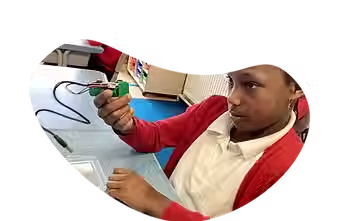.png)
.png)
.png)
Coding for Climate Action
.png)

Interactive KS2 and KS3 computing units using micro:bits to investigate natural hazards, design early warning systems, and address climate change through hands-on, project-based coding; all while building essential digital skills for future careers in tech and environmental innovation.
How does it work?
Code
Learn core digital skills and computing concepts
-
Understand variables, inputs/outputs, and selection
-
Explore data logging and radio communication
-
Use micro:bits to write, test, and refine code
Create
Build real-world solutions using tech and teamwork
-
Design early warning systems for climate hazards
-
Work with sensors and components to collect data
-
Create interactive projects that simulate real events
Take Action
Connect learning to climate change and community impact
-
Investigate climate health, careers, and local issues
-
Reflect on sustainability, wellbeing, and resilience
-
Present solutions and share ideas for positive change


Year 4 - Data logging. Pupils use micro:bits to log data and explore climate issues like food, fitness, and the environment.
Year 5 - Engineering Early Warning Systems. Pupils use micro:bits to build simple warning systems for natural hazards using sensors, circuits, and radio signals.
Year 6 - Designing Climate Warning Systems. Pupils use micro:bits to create alert systems for climate hazards, combining sensors, radio signals, and machine learning in a final team project.
Year 7 - Climate Action with micro:bit. Pupils design and test early warning systems using sensors, data logging, and radio communication, applying real-world coding and engineering principles to tackle climate hazards.
Year 8 - Data Science with Python. Pupils explore climate issues using Python to analyse, visualise, and present data, learning key coding and problem-solving skills.





.png)
Case studies
-
85% of teachers would recommend to peers
-
91% would participate again
Pupil feedback
"I enjoyed learning about the natural disasters; I got to fully realise which natural disasters have a big impact"


Primary Teachers


